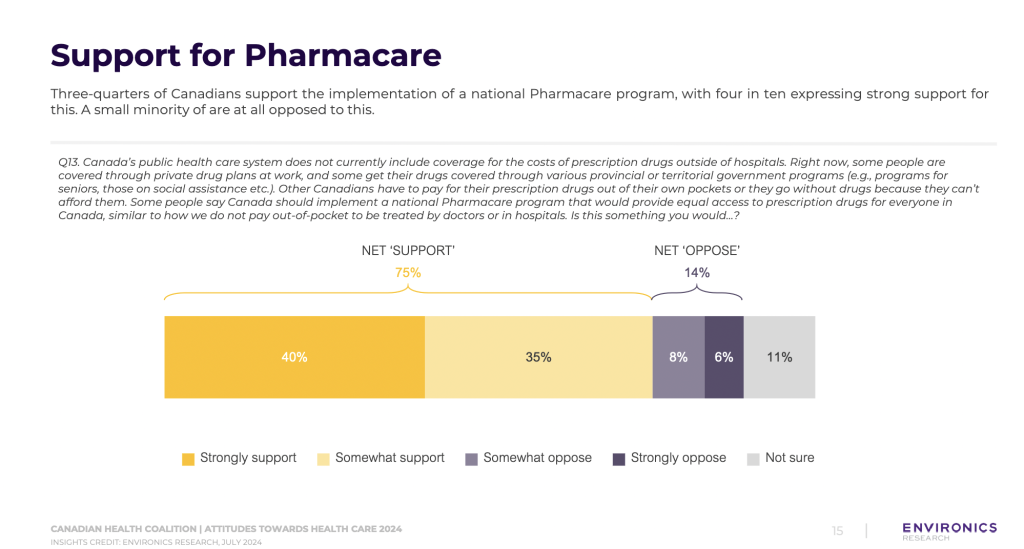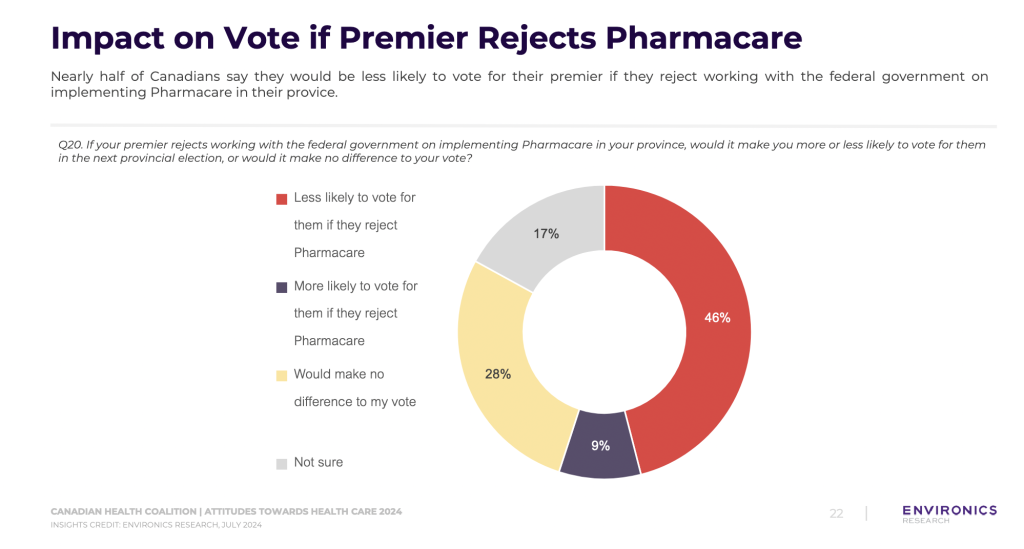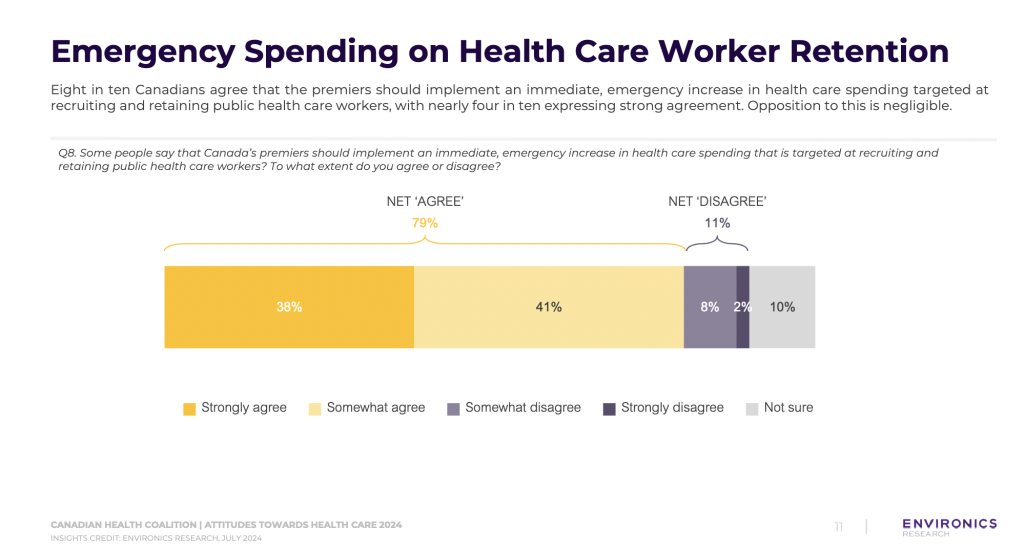Pharmacare is a vote getter: poll
Canadians want pharmacare and they are prepared to vote their premier out if they don’t support it. That’s one finding from a recent poll of health care attitudes by Environics Research.
Derek Leebosh of Environics Research and Steven Staples of the Canadian Health Coalition discussed the poll results with Anne Lagacé Dowson, Media Director of the Canadian Heath Coalition at a webinar on September 17, 2024. The poll of 2,135 Canadians conducted from June 26 to July 9 noted deep public concern about public health care.
The webinar can be viewed here –
Canadians want their premiers to work with the federal government to end what 74 per cent believe is a crisis in their provincial health care systems.
Leebosh noted that over 80 per cent of people in the Atlantic provinces and Québec think that health care in their province is currently in a state of crisis.
On pharmacare, Leebosh said “what’s very notable here is that 75 per cent of Canadians expressed support for it, with 40 per cent strongly supporting it. The proportion of people who oppose it is only 14 per cent.”
“When we cross-tabulated this by how people would vote in a federal election, we found that 63 per cent of Conservative voters support a national pharmacare program,” said Leebosh.
“When we look at the provincial breakdown, it’s remarkably consistent across the country. It’s consistently between 75 and 80 per cent in every province,” said Leebosh.
The highest level of support for pharmacare is in Nova Scotia, where 52 per cent expressed strong support.

“When we mentioned that the first step of the federal government’s pharmacare program is to work with provinces to provide free coverage for two types of medications, contraceptives as well as diabetes medications and devices, we found that 80 per cent of people strongly or somewhat support that,” said Leebosh.
“It’s really interesting to see the leaders of two federal parties claiming victory for the Pharmacare Act when it was passed in June,” said Staples. “I think that’s a very positive thing and is reflected in these polling numbers in terms of where people were with getting their province on side.”
“The first province has stepped up. It’s British Columbia,” said Staples who explained that the province and federal government have signed a Memorandum of Understanding to come to an agreement on not only prescription contraception and diabetes medication but also hormone replacement therapy.
Staples noted that BC has shown what can happen when the federal government provides funding for drugs that may already be covered by the province. “They could have just pocketed some of the money… but instead BC said we’re going to take it and further expand the program to include hormone replacement therapy for all those going through menopause,” said Staples who noted that pharmacare legislation needs to pass now as it will be hard for any future government to take away.
The poll revealed that people with lower incomes are more in favour of pharmacare than those with higher incomes and who are employed on a full-time basis. This is not surprising given that the high-income earners are more likely to already have drug plans. Support was also a little bit softer in Quebec, which Dowson noted may due to the provincial drug program. Leebosh linked it to old jurisdictional battles between Quebec and Ottawa. Leebosh also noted that pharmacare support was high in Atlantic Canada as well as in Alberta and Saskatchewan.
Leebosh noted the three provincial elections coming up. “We ask people if your premier rejects working with the federal government on implementing pharmacare in your province, would it make you more or less likely to vote for them in the next provincial election or would it make no difference? Forty-six per cent said they would be less likely to vote for their premier and their party if they rejected pharmacare,” said Leebosh.
“In New Brunswick, for example, which is going to be having a provincial election this fall, 52 per cent of people said they’d be less likely to vote for their premier if they rejected pharmacare. In Saskatchewan, it’s 43 per cent, which also has an election coming up. In BC, it’s 46 per cent. Highest of all is Nova Scotia at 54 per cent, which is looking at an election sometime in 2025,” added Leebosh.

Staples added that recent elections have shown that public heath care support is a vote getter.
“In Manitoba, where Wab Kinew was elected, it was a health care election and in Nova Scotia arguably their last provincial election was also about health care and the Conservatives won, so it seems that no matter which party is prepared to champion health care, it’s a vote getter,” said Staples.
With 6.5 million Canadians estimated to not have primary care providers, health care staffing was also a question put to those who did the survey.
About two-thirds of people think their provincial premier and government are not doing nearly enough to address health care worker retention while 25 per cent think they are doing as much as they can under the circumstances.
An overwhelming 81 per cent supported collaboration between provinces and the federal government on health care worker retention and recruitment, and 79 per cent strongly or somewhat agreed with emergency spending on health care retention.

“We know the factors contributing to the crisis in health care worker retention, wages for one, we’ve seen big strikes in Quebec and Ontario, but it’s also working conditions. Can you imagine working in a job where you have mandatory overtime? The burn-out factor is huge. You can’t blame a person from wanting an off-ramp from that kind of life,” said Staples who noted how private companies are poaching exhausted health care workers out of the public system and paying them more but billing the public system an immense amount.
“It’s like the government is firing workers and hiring them back as consultants,” added Leebosh.
The panelists returned to talking about pharmacare and how support for it crosses party lines. The Pharmacare Act is currently with the Senate. The Canadian Health Coalition is hoping that it will be fast-tracked so that agreements with the provinces and territories can be forged and medicine can get in the hands of people who need it now.
Support the Canadian Health Coalition



